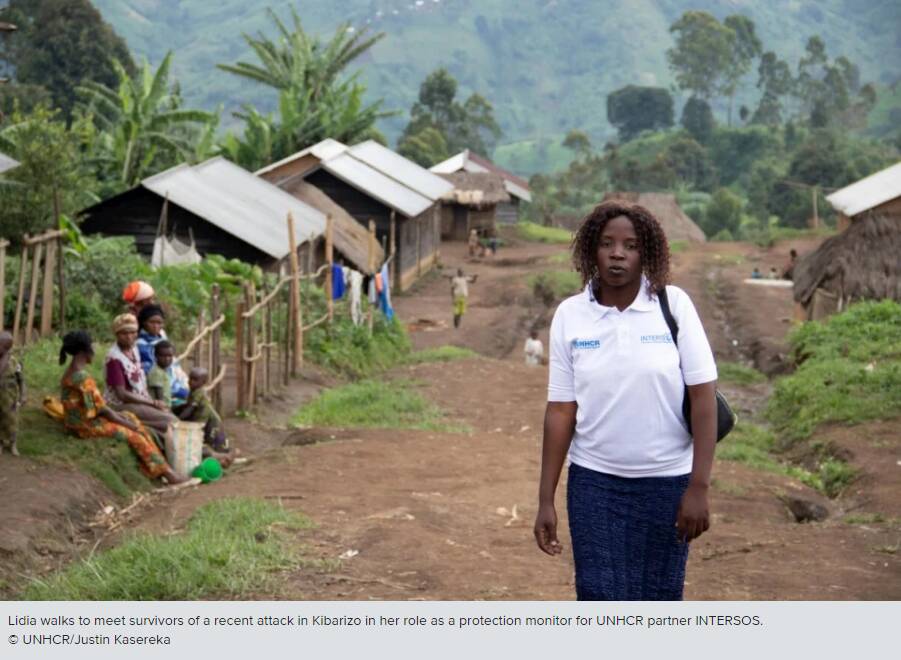Community workers brave odds to support survivors of violence in the DRC

Community workers brave odds to support survivors of violence in the DRC
By Sanne Biesmans, in Kitshanga, Democratic Republic of the Congo, 10 Mar 2022
URL: https://www.unhcr.org/news/stories/2022/3/621fba594/community-workers-brave-odds-help-survivors-violence-dr-congo.html
As Lidia Ajuwa, 30, walks down the hill into Kibarizo, a remote village in the eastern Democratic Republic of the Congo’s North Kivu province, she is greeted with smiles as she passes rows of small, grass-thatched houses. Hers is a familiar and friendly face in a region that for years has grappled with insecurity.
Every week, hundreds of incidents against civilians are recorded in eastern DRC by people like Lidia. During 2021, UNHCR, through INTERSOS, recorded more than 65,000 separate human rights abuses in the east of the country alone. More than 5.6 million Congolese were internally displaced at the end of 2021, the majority in the four eastern provinces of North and South Kivu, Ituri and Tanganyika.
Obed*, 25, will never forget the day in 2020 when he was caught in the crossfire between two armed groups.
“We couldn’t escape the fighting, we were just lying on the floor as the bullets flew over us,” he recalls. “At some point, I noticed my foot had swollen and realized I had been shot.”
Lidia heard of the attack and made her way to Obed’s home once the fighting had stopped. Together with a colleague, they took Obed to a dispensary in the village but there was no medication, so they paid for a motorcycle to take him to the next town for treatment.
“Lidia and her colleague really helped me,” says Obed. “I can only thank them, because without their help I would have died.”
UNHCR leads the protection response for internally displaced people in DRC, coordinating joint efforts with other UN agencies partner organizations such as INTERSOS to assist those in need.
Alexis Baruti, UNHCR’s Protection Associate based in Goma highlights the crucial role that Lidia and other protection monitors in the region play.
“By responding to protection alerts, people like Lidia can link survivors to lifesaving services and improve the overall protection of human rights of the communities in the region,” he says.
Collecting information about human rights violations and other protection incidents in a systematic manner allows for the analysis of trends by region and sector, revealing some of the driving factors such as inter-ethnic tensions, impunity for perpetrators and abuse of power.
UNHCR also collects alerts from other partners in order to have comprehensive data on human rights violations in areas hosting IDPs.
“This way, we can advocate for appropriate action and responses among the humanitarian community,” Baruti adds.
In a region still beset by violence and insecurity, Lidia’s work is never truly done. But as she moves on to the next location, she is driven by the knowledge that for every person she helps she is making a difference.
“What I love about this work is that I can contribute to the struggle of my people and help make the law a reality for them.”
* Names changed for protection reasons.
Every week, hundreds of incidents against civilians are recorded in eastern DRC by people like Lidia. During 2021, UNHCR, through INTERSOS, recorded more than 65,000 separate human rights abuses in the east of the country alone. More than 5.6 million Congolese were internally displaced at the end of 2021, the majority in the four eastern provinces of North and South Kivu, Ituri and Tanganyika.
Obed*, 25, will never forget the day in 2020 when he was caught in the crossfire between two armed groups.
“We couldn’t escape the fighting, we were just lying on the floor as the bullets flew over us,” he recalls. “At some point, I noticed my foot had swollen and realized I had been shot.”
Lidia heard of the attack and made her way to Obed’s home once the fighting had stopped. Together with a colleague, they took Obed to a dispensary in the village but there was no medication, so they paid for a motorcycle to take him to the next town for treatment.
“Lidia and her colleague really helped me,” says Obed. “I can only thank them, because without their help I would have died.”
UNHCR leads the protection response for internally displaced people in DRC, coordinating joint efforts with other UN agencies partner organizations such as INTERSOS to assist those in need.
Alexis Baruti, UNHCR’s Protection Associate based in Goma highlights the crucial role that Lidia and other protection monitors in the region play.
“By responding to protection alerts, people like Lidia can link survivors to lifesaving services and improve the overall protection of human rights of the communities in the region,” he says.
Collecting information about human rights violations and other protection incidents in a systematic manner allows for the analysis of trends by region and sector, revealing some of the driving factors such as inter-ethnic tensions, impunity for perpetrators and abuse of power.
UNHCR also collects alerts from other partners in order to have comprehensive data on human rights violations in areas hosting IDPs.
“This way, we can advocate for appropriate action and responses among the humanitarian community,” Baruti adds.
In a region still beset by violence and insecurity, Lidia’s work is never truly done. But as she moves on to the next location, she is driven by the knowledge that for every person she helps she is making a difference.
“What I love about this work is that I can contribute to the struggle of my people and help make the law a reality for them.”
* Names changed for protection reasons.